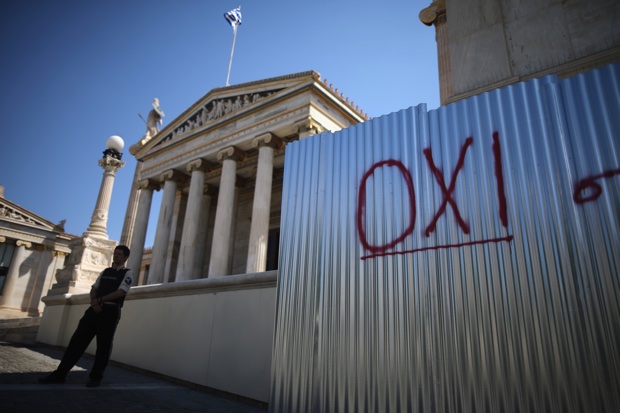Tonight it looks like the Oxi’s have it, and Greece’s fraught relationship with the Franks has reached a new phase, with possible Grexit coming; that’s assuming the exit polls are correct and that this whole torturous episode doesn’t continue. Whether Grexit takes place or not, though, the whole episode has fundamentally damaged the European Union by undermining the very idea it was built on – solidarity.
If you ever get Irish people on the subject of the Great Famine, the essential point they always make is that had the potato blight hit Yorkshire, no one would have starved because London would have come to its aid. Yorkshire is the example used, because it’s far away enough from London but the people are regarded as being the same. The people of Ireland were not, clearly.
Likewise when you look at the hardships facing the Greeks, and wherever blame is portioned, do you think the moneymen in Frankfurt would stand for that if it was happening in Brandenburg or Saxony? Would Parisians allow such misery to afflict Provence?
This is not to compare the Greek tragedy with the Irish famine in terms of size or blame – it’s nothing like it, and the Greek ruling class was complicit in this disaster. And yet the EU has started behaving like an ineffectual empire dealing with a rebellious colony.
It is in Greece’s best interests to leave the euro as soon as possible, and a benevolent European Union would try to help it move to the drachma as painlessly as possible. The only logical explanation for why the EU is trying to keep it in is because Grexit would damage the EU; not just the economic stability of the eurozone, but the very momentum of the union itself. Once the EU starts to shrink then, with other empires, it will gather its own momentum.
Ultimately the euro is a failing idea because it lacks what the medieval Islamic historian Ibn Khaldun defined as the all-important factor of human history – asabiyya, or ‘group feeling’. The strength of any state, and any institution, lies in its ability to inspire asabiyya, without which it crumbles, for as the historian wrote: ‘Strength is obtained only through group feeling which means affection and willingness to fight and die for each other.’ Where is the affection for Greece?
Without asabiyyah, he wrote, there could be no sovereignty or legitimacy; instead people could only be ruled by force or fear. In the case of empires, fear of physical harm; in Greece’s case fear of economic ruin.
What’s interesting about the 5 July referendum is that it emphasises a key reality of 21st century politics, that the divide is not so much Left v Right but one of globalists v localists. On the one hand the global financial authorities, the EU, the banks and big business and the pro free-trade economists; on the other a strange combination of radical leftists opposed to austerity and ‘neoliberalism’ (whatever that means), as well as nationalists (both decent and deranged) and Burkean conservatives. The difference these days is that the former also go in for utopian ideals, whether it’s the euro or immigration, because they ignore the social implications of group feeling and think only in terms of economics not history; capitalism as the new Communism.
In fact one reason it’s difficult for commentators not to use mythology as a standard cliche template for the crisis is because, like a Greek tragedy, the whole European project has ended up causing the very conflict it was designed to end – conflict and disharmony between nations. It’s like Oedipus deciding to avoid his fate of marrying his mother by leaving town and shacking up with a woman twice his age. It seemed like a good idea at the time.







Comments